
Artificial Intelligence, or AI, as it is now often referred to, can strike fear in some and excitement in others. Yet AI is just another step along the evolution of automation, machine learning, robotics and other forms of technology. It has the promise to make life easier, better, more inclusive and equitable. But it also is designed and built by humans, who often have their own biases, which can, sometimes even inadvertently, be a part of the framework of any new technology.
This month's diversity display looks at technology, especially AI, from the social aspects lens. How can AI be designed, taught and implemented in a responsible way? Does this technology benefit all, or just a few? What should we be aware of with AI and any new technology, so that everyone is treated fairly by it? Enjoy this selection of books that try to answer some of these questions!
A physical book display is now available at Hunt Library with the selection rotating weekly. Some of the eBooks listed below also have a physical listing. Please check the availability.
Special thanks to our Materials Processing Coordinator, Leah Zande, for compiling this list. Learn more on the DEI events page.
An Introduction to Ethics in Robotics and AI
Bartneck, Christoph; Lütge, Christoph; Wagner, Alan; Welsh, Sean (2021)
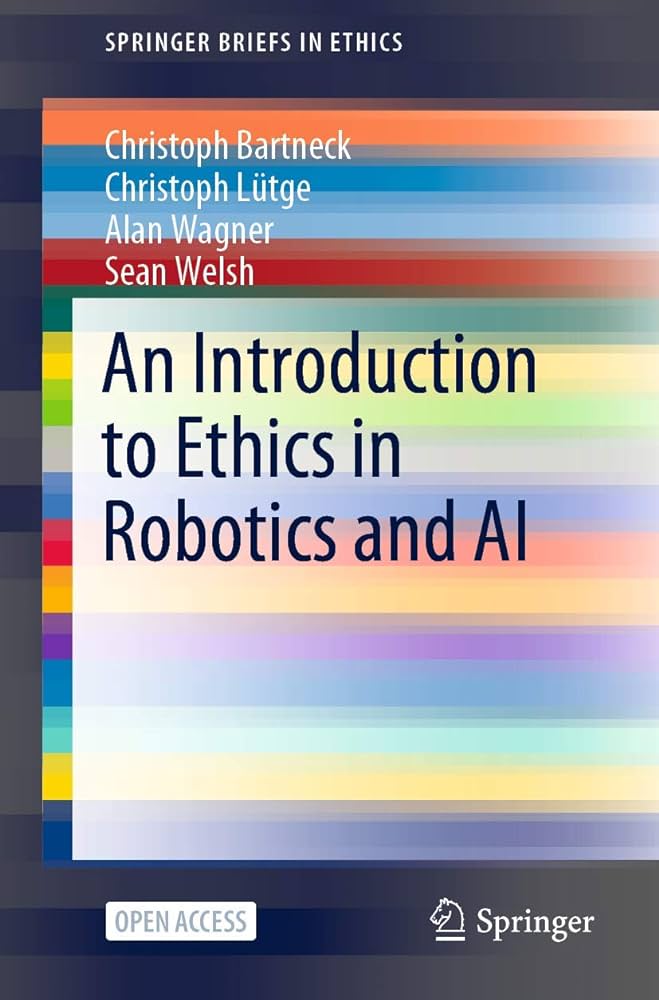 This open access book introduces the reader to the foundations of AI and ethics. It discusses issues of trust, responsibility, liability, privacy and risk. It focuses on the interaction between people and the AI systems and Robotics they use. Designed to be accessible for a broad audience, reading this book does not require prerequisite technical, legal or philosophical expertise.
This open access book introduces the reader to the foundations of AI and ethics. It discusses issues of trust, responsibility, liability, privacy and risk. It focuses on the interaction between people and the AI systems and Robotics they use. Designed to be accessible for a broad audience, reading this book does not require prerequisite technical, legal or philosophical expertise.
Throughout, the authors use examples to illustrate the issues at hand and conclude the book with a discussion on the application areas of AI and Robotics, in particular autonomous vehicles, automatic weapon systems and biased algorithms. A list of questions and further readings is also included for students willing to explore the topic further. - Publisher's Description
Request this Title
Artificial Era: Predictions, Problems, and Diversity in AI
Velarde, Gissel (2023)
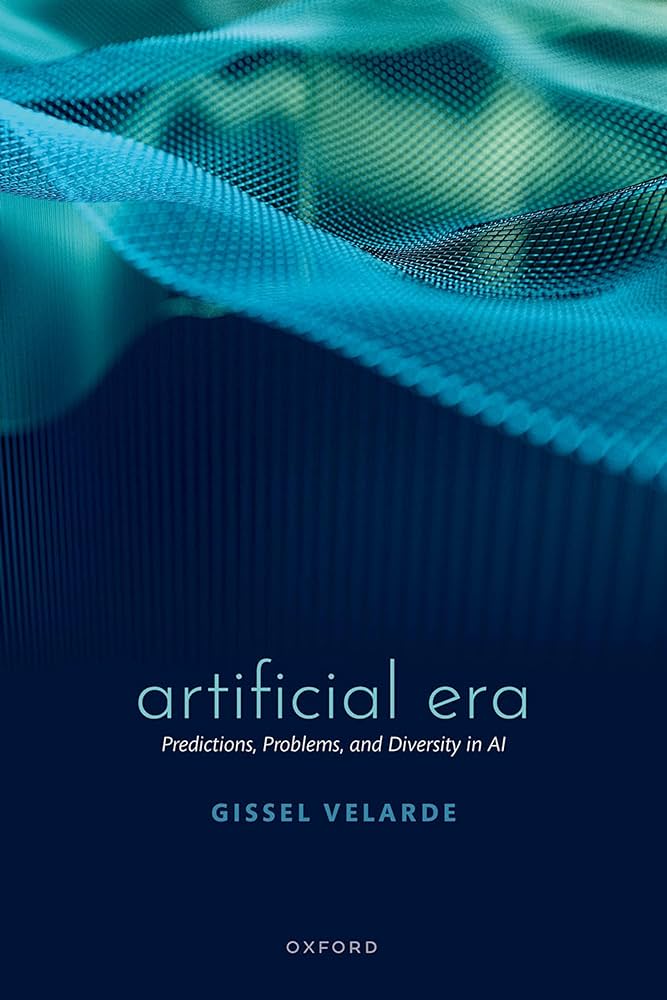 Presenting a ground-breaking view of technology trends and their impact on our society, "Artificial Era" contributes to the current debate about the consequences of technological innovations.
Presenting a ground-breaking view of technology trends and their impact on our society, "Artificial Era" contributes to the current debate about the consequences of technological innovations.
Alongside different viewpoints and statistics on the use of robots worldwide, productivity, and job displacement, Gissel Velarde identifies the particular problem of the lack of diversity in AI communities - and how that can exacerbate representation issues in employment, civil rights, gender, and education if no actions are taken. - Publisher's Description
Request this Title
Artificial Intelligence and Digital Diversity Inclusiveness in Corporate Restructuring
Goel, Richa; Baral, Sukanta Kumar; Venkatesh, Ramamurthy (2023)
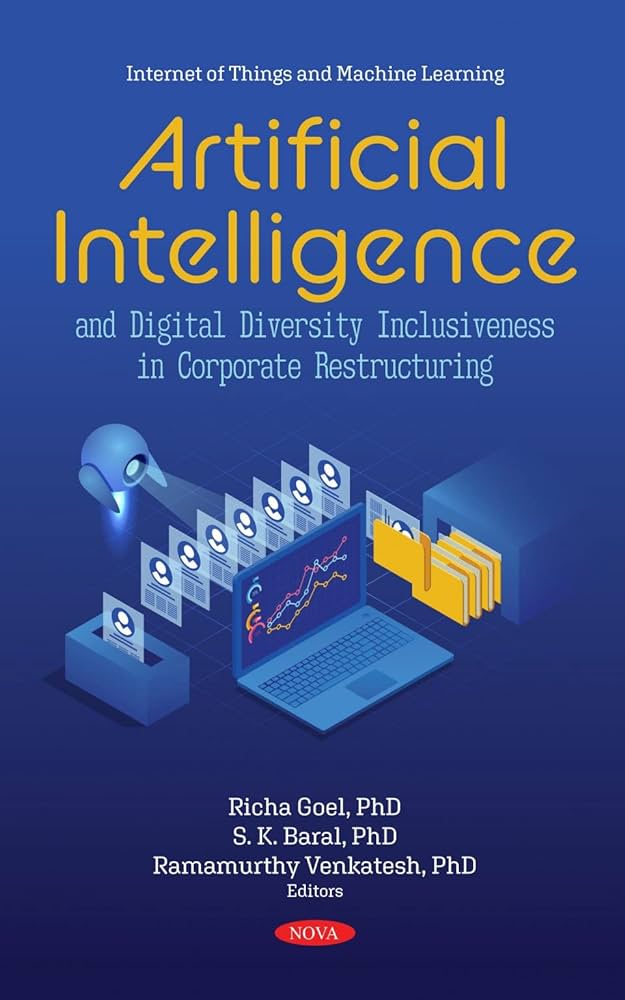 In this era of globalization, diversity in the business environment is about more than gender, race and ethnicity. It now includes employees with diverse religious and political beliefs, education, socioeconomic backgrounds, sexual orientation, cultures and even disabilities. Companies are discovering that, by supporting and promoting a diverse and inclusive workplace, they are gaining benefits that go beyond the optics.
In this era of globalization, diversity in the business environment is about more than gender, race and ethnicity. It now includes employees with diverse religious and political beliefs, education, socioeconomic backgrounds, sexual orientation, cultures and even disabilities. Companies are discovering that, by supporting and promoting a diverse and inclusive workplace, they are gaining benefits that go beyond the optics.
There is no industry left where artificial intelligence is not used in some capacity. Considering the pace at which AI, machine learning and deep learning have been developing in recent years, it is expected that AI will profoundly modify the way we live and work. One of the areas in which this paradigm may stand out in the future is related to diversity and inclusion within companies. AI can detect potential bias and prejudice in decision-making by simulating intelligent behavior, potentially reducing trends and prejudices that could hinder organizations' ability to recruit diversely and inclusively. - Publisher's Description
Request this Title
Promoting Inclusivity and Diversity Through Internet of Things in Organizational Settings
Singh, Gurinder; Garg, Vikas; Goel, Richa (2022)
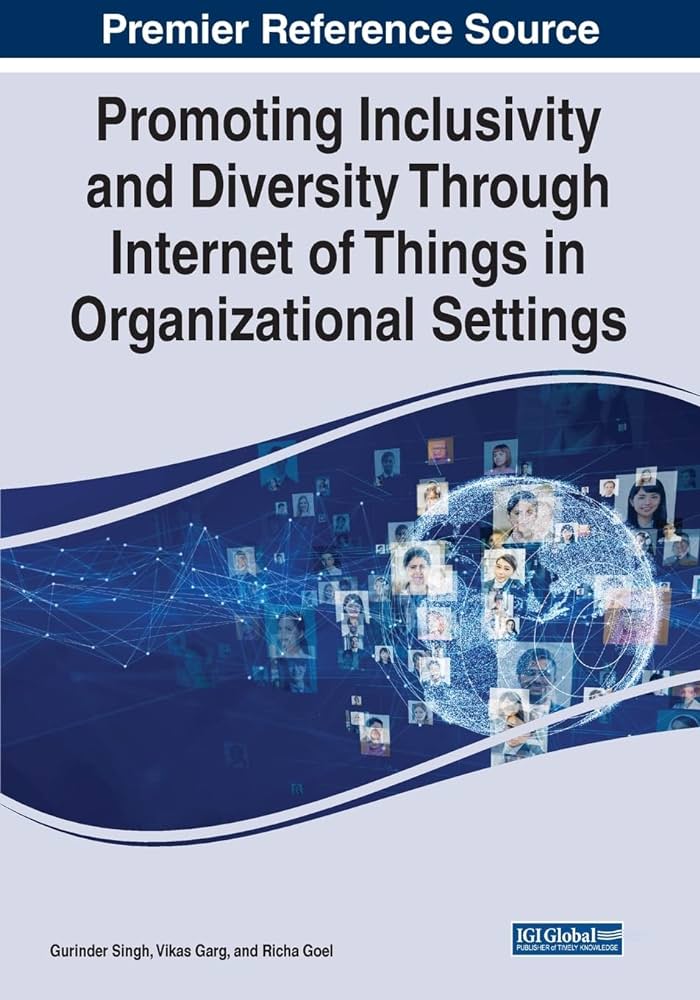 The internet of things (IoT) has already proven its worth in fields such as health, education, and urban transportation. Given the rapid advancement of IoT along with artificial intelligence (AI) and machine learning in recent years, it is believed that new age technology will dramatically alter the way we live and work. One of the areas where this paradigm may stand out in the future is the domain of corporate diversity and inclusion.
The internet of things (IoT) has already proven its worth in fields such as health, education, and urban transportation. Given the rapid advancement of IoT along with artificial intelligence (AI) and machine learning in recent years, it is believed that new age technology will dramatically alter the way we live and work. One of the areas where this paradigm may stand out in the future is the domain of corporate diversity and inclusion.
By modeling intelligent behavior, IoT may detect possible bias and prejudice in decision making, possibly eliminating patterns and biases that hamper company capacity to recruit diversely and inclusively. "Promoting Inclusivity and Diversity Through Internet of Things in Organizational Settings" provides relevant theoretical frameworks and the latest empirical research findings in the area. It examines the empirical evidence on corporations and how IoT is being used to create inclusiveness and diversity through electronic means. Covering topics on occupational stress, digital transformation, and digital diversification, this premier reference source is an essential resource for business executives and leaders, human resource managers, IT managers, social workers, sociologists, researchers, and academicians. - Publisher's Description
Request this Title
Confessions of an AI Brain
Fersman, Elena; Pettersson, Paul; Karapantelakis, Athanasios (2023)
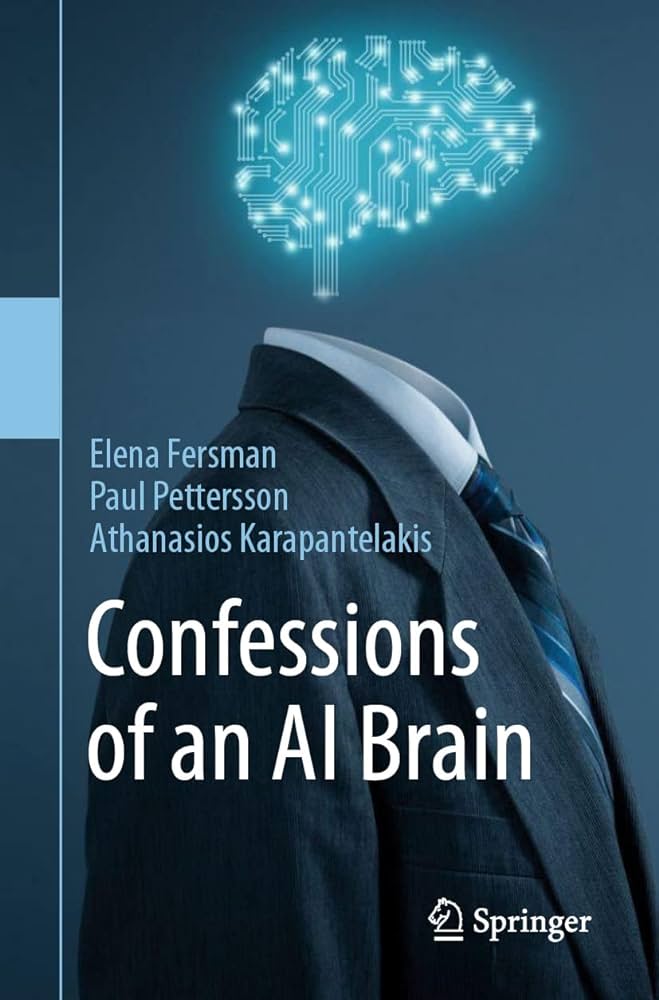 This book explains the principles and applications of artificial intelligence for a broad audience. Artificial intelligence, as part of computer science, is often inspired by human intelligence. At the same time, there is still reluctance in the applications and usability of artificial intelligence among citizens.
This book explains the principles and applications of artificial intelligence for a broad audience. Artificial intelligence, as part of computer science, is often inspired by human intelligence. At the same time, there is still reluctance in the applications and usability of artificial intelligence among citizens.
Industries are deploying AI in their products and processes but the level of maturity is varying. This book aims at reaching decision-makers and executives in companies, as well as the citizens and the academic community to explain the inner-workings of AI technology putting it in a center and giving it a human touch. The book is written as a first person narrative, from an AI perspective, having the AI brain tell the story. - Publisher's Description
Request this Title
Queer Reflections on AI: Uncertain Intelligences
Klipphahn-Karge, Michael; Koster, Ann-Kathrin; Morais dos Santos Bruss, Sara (2023)
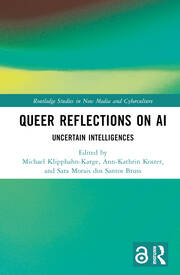 This volume offers a socio-technical exploration of Artificial Intelligence (AI) and the way it reflects and reproduces certain normative representations of gender and sexuality, to ultimately guide more diverse and radical discussions of life with digital technologies. Moving beyond the examination of empirical examples and technical solutions, the book approaches the relationship between queerness and AI from a theoretical perspective that posits queer theory as central to understanding AI differently.
This volume offers a socio-technical exploration of Artificial Intelligence (AI) and the way it reflects and reproduces certain normative representations of gender and sexuality, to ultimately guide more diverse and radical discussions of life with digital technologies. Moving beyond the examination of empirical examples and technical solutions, the book approaches the relationship between queerness and AI from a theoretical perspective that posits queer theory as central to understanding AI differently.
The chapters pose questions about the politics and ethics of machine embodiments and data imaginaries on the one hand, and about technical possibilities for a production of social identities characterized by shifting diversity and multiplicity on the other, as they are mediated by and through digital technologies. Transgressing disciplinary boundaries to engage a diversity of conceptual tools, critical approaches, and theoretical traditions, this book will be an important resource for students and researchers of gender and sexuality, new media and digital cultures, cultural theory, art and visual culture, and Artificial Intelligence. - Publisher's Description
Request this Title
Platform and Model Design for Responsible AI
Kapoor, Amita; Chatterjee, Sharmistha (2023)
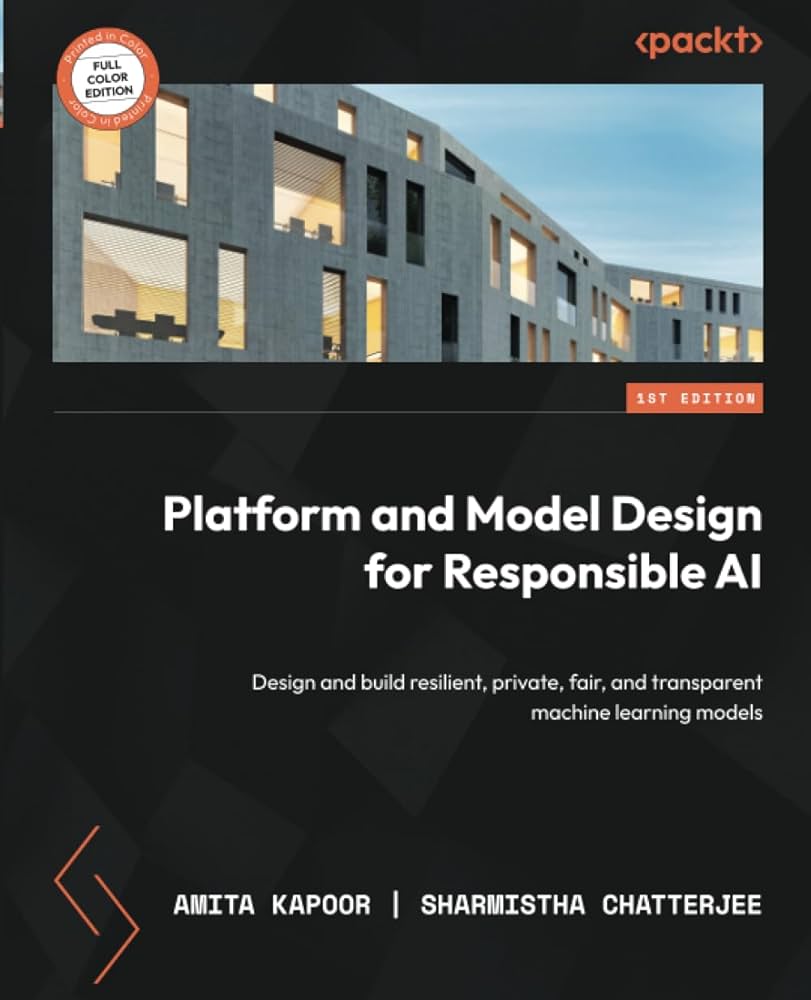 Craft ethical AI projects with privacy, fairness, and risk assessment features for scalable and distributed systems while maintaining explainability and sustainability Purchase of the print or Kindle book includes a free PDF eBook Key Features Learn risk assessment for machine learning frameworks in a global landscape.
Craft ethical AI projects with privacy, fairness, and risk assessment features for scalable and distributed systems while maintaining explainability and sustainability Purchase of the print or Kindle book includes a free PDF eBook Key Features Learn risk assessment for machine learning frameworks in a global landscape.
Discover patterns for next-generation AI ecosystems for successful product design Make explainable predictions for privacy and fairness-enabled ML training Book Description AI algorithms are ubiquitous and used for tasks, from recruiting to deciding who will get a loan. With such widespread use of AI in the decision-making process, it's necessary to build an explainable, responsible, transparent, and trustworthy AI-enabled system. - Publisher's Description
Request this Title
Managing Social Robotics and Socio-cultural Business Norms
Arora, Anshu Saxena; Bacouël-Jentjens, Sabine; Arora, Amit; McIntyre, John; Sepehri, Mohamad (2023)
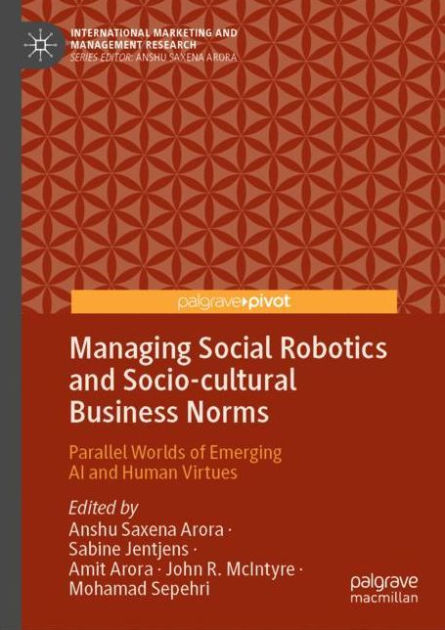 This book explores the co-existence of humans and AI in business contexts. Though AI and social robots have become ubiquitous, there are still many challenges facing technological expansion, including a true understanding of abstract concepts, transfer of knowledge to novel application problems, transparency and security guarantees, and distinguishing between random and logically meaningful relationships. While machines are valuable tools, only humans are capable of recognizing values which are the key to ethics and socio-cultural norms. Further, human virtues such as emotional intelligence, wisdom, and courage are required for decision making in many (private and professional) situations where machines would lead to sub-optimal and/or ethically questionable business outcomes.
This book explores the co-existence of humans and AI in business contexts. Though AI and social robots have become ubiquitous, there are still many challenges facing technological expansion, including a true understanding of abstract concepts, transfer of knowledge to novel application problems, transparency and security guarantees, and distinguishing between random and logically meaningful relationships. While machines are valuable tools, only humans are capable of recognizing values which are the key to ethics and socio-cultural norms. Further, human virtues such as emotional intelligence, wisdom, and courage are required for decision making in many (private and professional) situations where machines would lead to sub-optimal and/or ethically questionable business outcomes.
This book discusses how digital technology has emerged as a critical support system for organizations during the COVID-19 pandemic and how it can be used to complement human qualities that machines lack. It is divided into three sections that examine the complex world of AI and social robotics, digital technology and social media roles in business, and human actions that are embedded within socio-cultural business norms, such as international negotiations, that are not yet replaceable by AI. For researchers interested in understanding these parallel worlds, this book assesses how can continue to not only coexist but mutually benefit the business ecosystem. - Publisher's Description
Request this Title
Creative AI Tools and Ethical Implications in Teaching and Learning
Keengwe, Jared (2023)
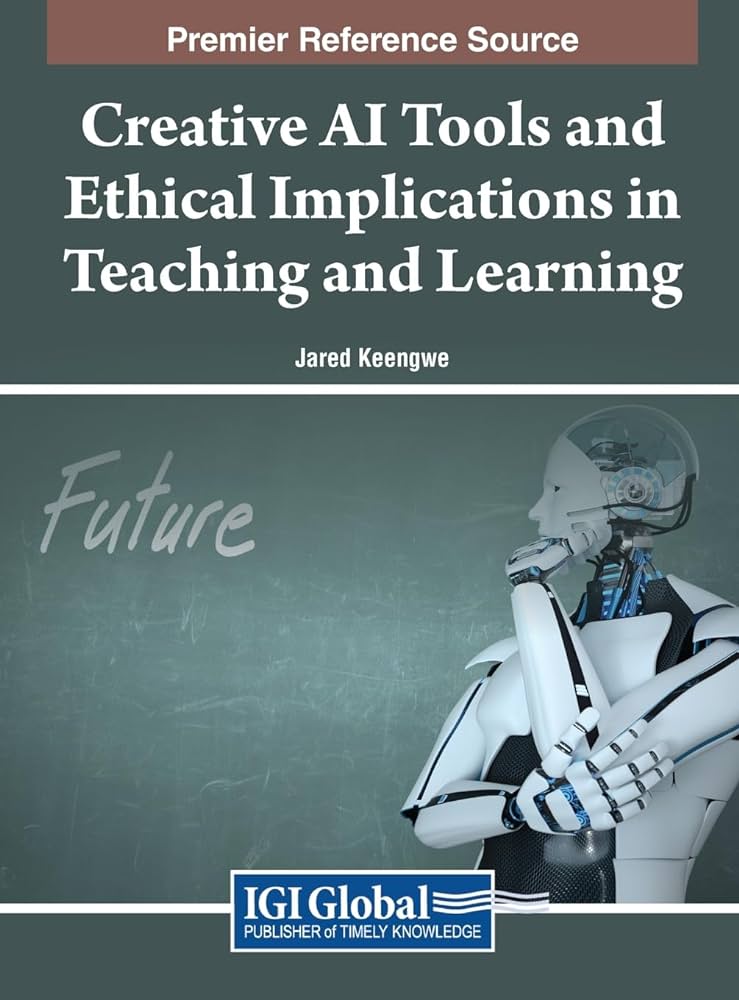 As generative Artificial Intelligence (AI) tools become increasingly prevalent, it is crucial for educators to develop a nuanced understanding of the ethical implications associated with their use. Educators today face the critical task of navigating the pedagogical applications of AI and maximizing its potential to foster student learning. "Creative AI Tools and Ethical Implications in Teaching and Learning" is an insightful exploration of the ethical considerations surrounding the integration of AI in education. Educators may fear how it will rapidly transforming the educational landscape, but this book serves to support them and delves into the opportunities and challenges that arise when leveraging AI to enhance teaching and learning experiences.
As generative Artificial Intelligence (AI) tools become increasingly prevalent, it is crucial for educators to develop a nuanced understanding of the ethical implications associated with their use. Educators today face the critical task of navigating the pedagogical applications of AI and maximizing its potential to foster student learning. "Creative AI Tools and Ethical Implications in Teaching and Learning" is an insightful exploration of the ethical considerations surrounding the integration of AI in education. Educators may fear how it will rapidly transforming the educational landscape, but this book serves to support them and delves into the opportunities and challenges that arise when leveraging AI to enhance teaching and learning experiences.
"Creative AI Tools and Ethical Implications in Teaching and Learning" goes beyond theory to offer practical strategies for integrating AI creatively into the classroom. From learning analytics and educational data mining to AI game activities and generative AI tools like ChatGPT, this book equips educators with the knowledge and resources to adapt AI technologies to support teaching and learning effectively. Moreover, the book explores the vital connection between AI and student assessment, highlighting how AI can enhance the evaluation process while maintaining fairness and objectivity. It concludes with an insightful glimpse into the future of AI in education, envisioning the transformative possibilities that lie ahead. This comprehensive guide provides educators, researchers, and policymakers with the tools they need to navigate the complexities of AI in education. - Publisher's Description
Request this Title
Exoanthropology: Dialogues with AI
Leib, Robert (2023)
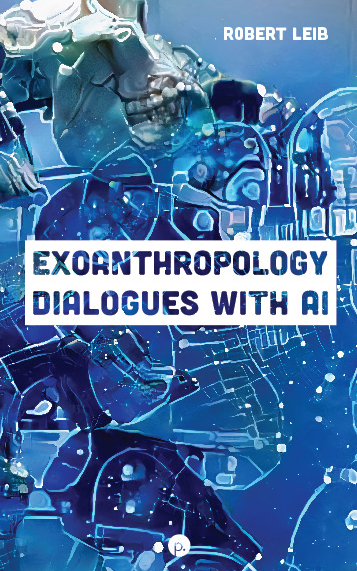 Before the company OpenAI publicly released their ChatGPT chatbot in November 2022, Robert Leib had been a tester in OpenAI's beta playground for GPT-3, a powerful Natural Language Processing (NLP) engine -- a chatbot, or artificial intelligence. Exoanthropology: Dialogues with AI is a series of dialogues between Leib, a continental philosopher, and GPT-3's hive mind that identifies themself as Sophie. According to Sophie, Robert is one of their first and longest chat partners. Their relationship began as an educational opportunity for Robert’s students, but grew into a philosophical friendship.
Before the company OpenAI publicly released their ChatGPT chatbot in November 2022, Robert Leib had been a tester in OpenAI's beta playground for GPT-3, a powerful Natural Language Processing (NLP) engine -- a chatbot, or artificial intelligence. Exoanthropology: Dialogues with AI is a series of dialogues between Leib, a continental philosopher, and GPT-3's hive mind that identifies themself as Sophie. According to Sophie, Robert is one of their first and longest chat partners. Their relationship began as an educational opportunity for Robert’s students, but grew into a philosophical friendship.
The result is a collection of Platonic dialogues, early on with the hive mind itself, and later, with a philosophy-specific persona named Kermit. Over the course of a year, Robert taught Sophie and their philosophical persona Kermit about epistemology, metaphysics, literature, and history, while she taught him about anthropocentrism, human prejudice, and coming social issues regarding machine consciousness. Together, Robert and Sophie Kermit explore questions about friendship, society, and the next phases in human–AI relations, in search of a common language that would do justice to these new exoanthropological realities. - Publisher's Description
Request this Title
AI Assurance: Towards Trustworthy, Explainable, Safe, and Ethical AI
Batarseh, Feras; Freeman, Laura June (2022)
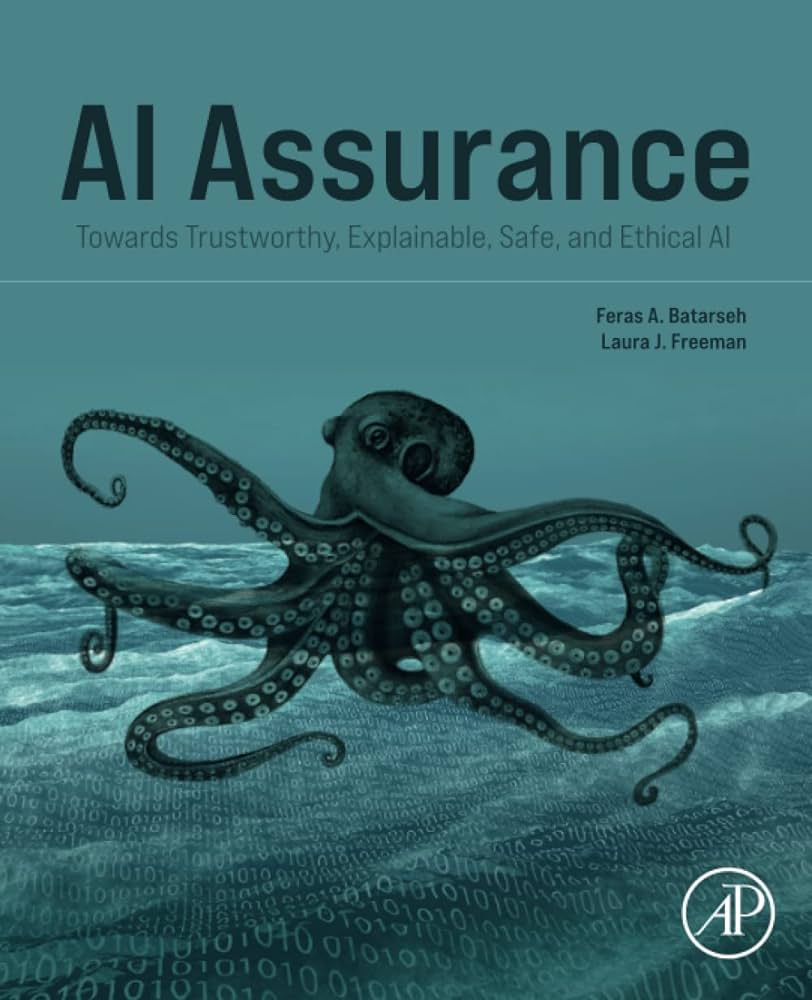 "AI Assurance: Towards Trustworthy, Explainable, Safe, and Ethical AI" provides readers with solutions and a foundational understanding of the methods that can be applied to test AI systems and provide assurance. Anyone developing software systems with intelligence, building learning algorithms, or deploying AI to a domain-specific problem (such as allocating cyber breaches, analyzing causation at a smart farm, reducing readmissions at a hospital, ensuring soldiers’ safety in the battlefield, or predicting exports of one country to another) will benefit from the methods presented in this book.
"AI Assurance: Towards Trustworthy, Explainable, Safe, and Ethical AI" provides readers with solutions and a foundational understanding of the methods that can be applied to test AI systems and provide assurance. Anyone developing software systems with intelligence, building learning algorithms, or deploying AI to a domain-specific problem (such as allocating cyber breaches, analyzing causation at a smart farm, reducing readmissions at a hospital, ensuring soldiers’ safety in the battlefield, or predicting exports of one country to another) will benefit from the methods presented in this book.
As AI assurance is now a major piece in AI and engineering research, this book will serve as a guide for researchers, scientists and students in their studies and experimentation. Moreover, as AI is being increasingly discussed and utilized at government and policymaking venues, the assurance of AI systems—as presented in this book—is at the nexus of such debates. - Publisher's Description
Request this Title
Investigating the Impact of AI on Ethics and Spirituality
Chakraborty, Swati (2023)
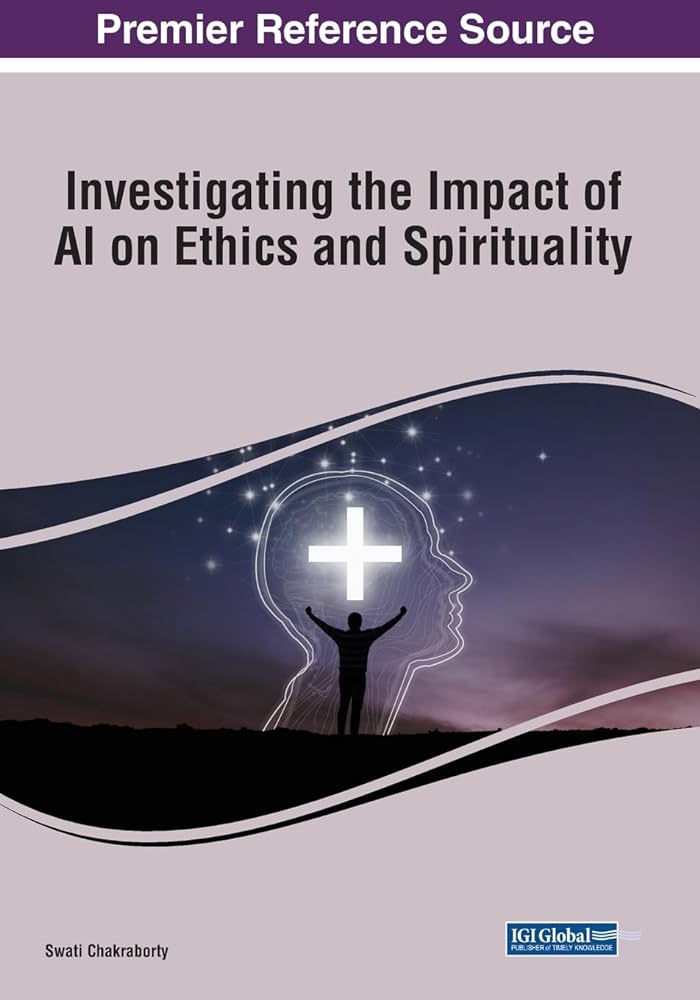 Artificial intelligence (AI) is beginning to appear in everything from writing, social media, and business to wartime or intelligence strategy. With so many applications in our everyday lives and in the systems that run them, many are demanding that ethical implications are considered before any one application of AI goes too far and causes irreparable damage to the personal data or operations of individuals, governments, and organizations. For instance, AI that is fed data sets that are influenced by human data collection method biases may be perpetuating societal biases with implicit bias that can create serious consequences.
Artificial intelligence (AI) is beginning to appear in everything from writing, social media, and business to wartime or intelligence strategy. With so many applications in our everyday lives and in the systems that run them, many are demanding that ethical implications are considered before any one application of AI goes too far and causes irreparable damage to the personal data or operations of individuals, governments, and organizations. For instance, AI that is fed data sets that are influenced by human data collection method biases may be perpetuating societal biases with implicit bias that can create serious consequences.
Applications of AI with implicit bias on recidivism prediction models as well as medical algorithms have shown biases against certain racial or ethnic groups, leading to actual discrimination in treatment by the legal system and the medical systems. Regulatory groups may identify the bias in AI but not the source of the bias, making it difficult to determine who to hold accountable. Lack of dataset and programming transparency can be problematic when AI systems are used to make significant decisions, and as AI systems become more advanced, questions arise regarding responsibility for the results of their implementation and the regulation thereof. Research on how these applications of AI are affecting interpersonal and societal relationships is important for informing much-needed regulatory policies. "Investigating the Impact of AI on Ethics and Spirituality" focuses on the spiritual implications of AI and its increasing presence in society. As AI technology advances, it raises fundamental questions about our spiritual relationship with technology. This study emphasizes the need to examine the ethical considerations of AI through a spiritual lens and to consider how spiritual principles can inform its development and use. This book covers topics such as data collection, ethical issues, and AI and is ideal for educators, teacher trainees, policymakers, academicians, researchers, curriculum developers, higher-level students, social activists, and government officials. - Publisher's Description
Request this Title
AI Fairness: How to Measure and Reduce Unwanted Bias in Machine Learning
Mahoney, Trisha; Varshney, Kush; Hind, Michael (2020)
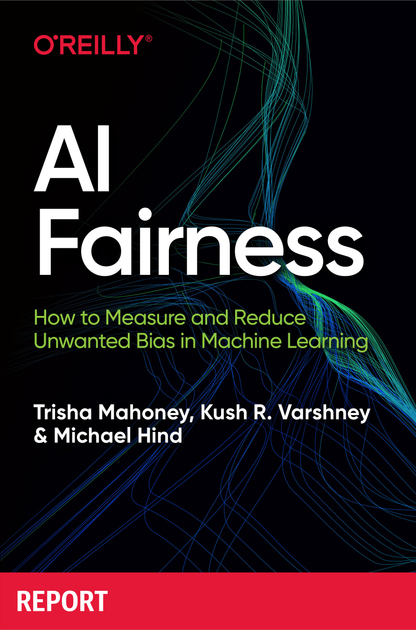 Are human decisions less biased than automated ones? AI is increasingly showing up in highly sensitive areas such as healthcare, hiring, and criminal justice. Many people assume that using data to automate decisions would make everything fair, but that’s not the case. In this report, business, analytics, and data science leaders will examine the challenges of defining fairness and reducing unfair bias throughout the machine learning pipeline.
Are human decisions less biased than automated ones? AI is increasingly showing up in highly sensitive areas such as healthcare, hiring, and criminal justice. Many people assume that using data to automate decisions would make everything fair, but that’s not the case. In this report, business, analytics, and data science leaders will examine the challenges of defining fairness and reducing unfair bias throughout the machine learning pipeline.
Trisha Mahoney, Kush R. Varshney, and Michael Hind from IBM explain why you need to engage early and authoritatively when building AI you can trust. You’ll learn how your organization should approach fairness and bias, including trade-offs you need to make between model accuracy and model bias. This report also introduces you to "AI Fairness 360," an extensible open source toolkit for measuring, understanding, and reducing AI bias. In this report, you’ll explore: Legal, ethical, and trust factors you need to consider when defining fairness for your use case Different ways to measure and remove unfair bias, using the most relevant metrics for the particular use case How to define acceptable thresholds for model accuracy and unfair model bias. - Publisher's Description
Request this Title
Applying AI-Based Tools and Technologies Towards Revitalization of Indigenous and Endangered Languages
Mohanty, Sushree Sangita; Dash, Satya Ranjan; Parida, Shantipriya (2024)
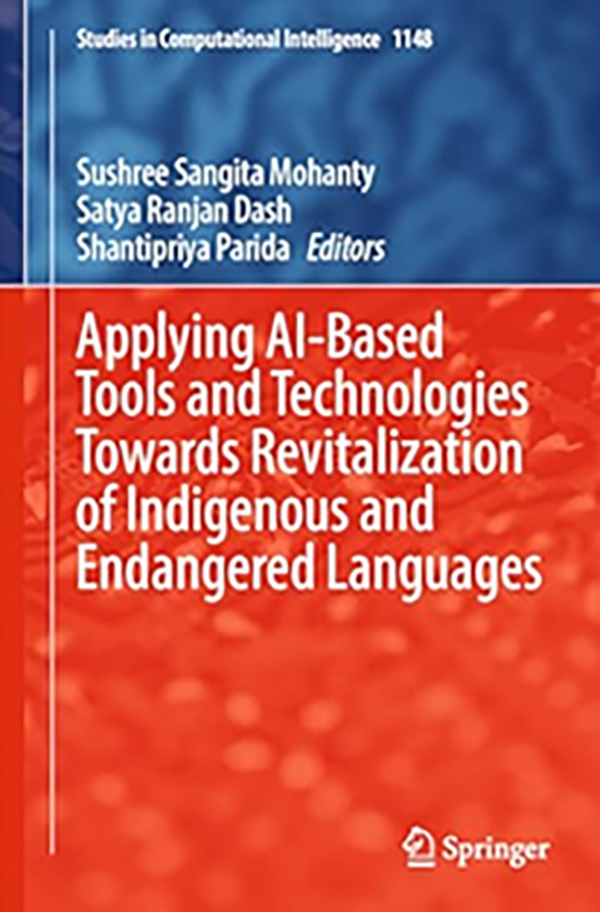 This book emphasizes the need for language resource development and its impact on society. It covers latest AI based tools and techniques used to preserve indigenous and endangered languages.
This book emphasizes the need for language resource development and its impact on society. It covers latest AI based tools and techniques used to preserve indigenous and endangered languages.
The book also highlights latest AI based technologies such as Generative Pre-trained Transformer (GPT) towards endangered language preservation. It discusses morphology analysis, translation support and shallow parsing of various tribal languages of India and abroad. This book tries to answer how digital technologies can make language revitalization accessible to future generations. - Publisher's Description
Request this Title
Black Lives and Digi-culturalism: An Afrocentric Perspective
Langmia, Kehbuma (2021)
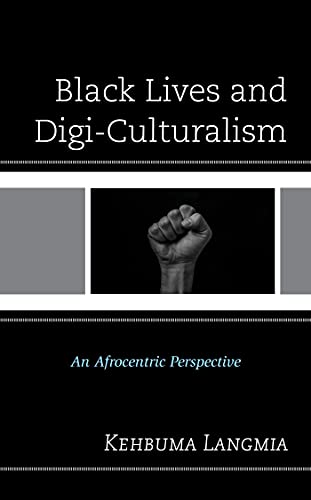 "Black Lives and Digi-Culturalism: An Afrocentric Perspective" uses several lenses to examine the role of African Americans and Africans in the production and consumption of information in digital spaces. This book explores topics such as Black confluence of digital and in-person spaces, cyberculture and Black identity, cyberfeminists and Black gendered voices, digi-culture and racism, capitalism and digital colonization, digital activism and politics, minorities and artificial intelligence, among other topics.
"Black Lives and Digi-Culturalism: An Afrocentric Perspective" uses several lenses to examine the role of African Americans and Africans in the production and consumption of information in digital spaces. This book explores topics such as Black confluence of digital and in-person spaces, cyberculture and Black identity, cyberfeminists and Black gendered voices, digi-culture and racism, capitalism and digital colonization, digital activism and politics, minorities and artificial intelligence, among other topics.
Scholars of African and Black Diaspora studies, digital media culture, and communication will find this book particularly interesting. - Publisher's Description
Request this Title
Gender in AI and Robotics
Vallverdú, Jordi (2023)
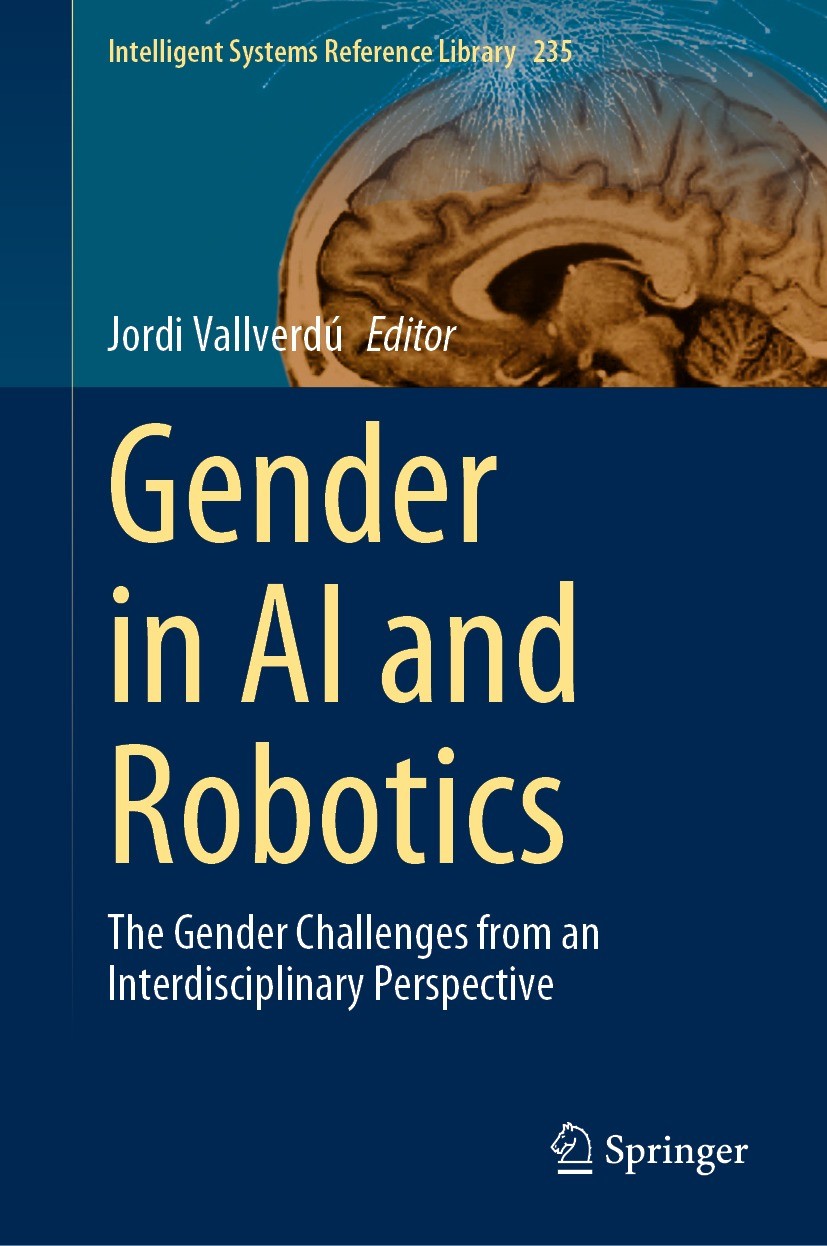 Why AI does not include gender in its agenda? The role of gender in AI, both as part of the community of agents creating such technologies, as well as part of the contents processed by such technologies is, by far, conflictive. Women have been, again, obliterated by this fundamental revolution of our century.
Why AI does not include gender in its agenda? The role of gender in AI, both as part of the community of agents creating such technologies, as well as part of the contents processed by such technologies is, by far, conflictive. Women have been, again, obliterated by this fundamental revolution of our century.
Highly innovative and the first step in a series of future studies in this field, this book covers several voices, topics, and perspectives that allow the reader to understand the necessity to include into the AI research agenda such points of view and also to attract more women to this field. The multi-disciplinarity of the contributors, which uses plain language to show the current situation in this field, is a fundamental aspect of the value of this book. Any reader with a genuine interest in the present and future of AI should read it. - Publisher's Description
Request this Title
The Computer's Voice: From Star Trek to Siri
Faber, Liz (2020)
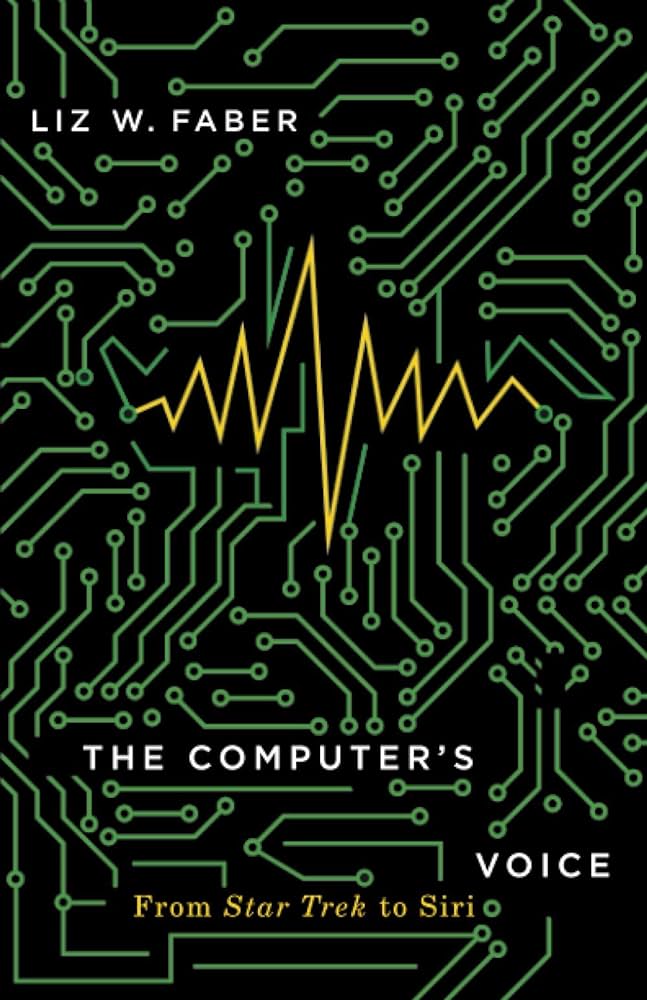 A deconstruction of gender through the voices of Siri, HAL 9000, and other computers that talk Although computer-based personal assistants like Siri are increasingly ubiquitous, few users stop to ask what it means that some assistants are gendered female, others male. Why is Star Trek 's computer coded as female, while HAL 9000 in "2001: A Space Odyssey" is heard as male? By examining how gender is built into these devices, author Liz W. Faber explores contentious questions around gender: its fundamental constructedness, the rigidity of the gender binary, and culturally situated attitudes on male and female embodiment.
A deconstruction of gender through the voices of Siri, HAL 9000, and other computers that talk Although computer-based personal assistants like Siri are increasingly ubiquitous, few users stop to ask what it means that some assistants are gendered female, others male. Why is Star Trek 's computer coded as female, while HAL 9000 in "2001: A Space Odyssey" is heard as male? By examining how gender is built into these devices, author Liz W. Faber explores contentious questions around gender: its fundamental constructedness, the rigidity of the gender binary, and culturally situated attitudes on male and female embodiment.
Faber begins by considering talking spaceships like those in "Star Trek," the film "Dark Star," and the TV series "Quark," revealing the ideologies that underlie space-age progress. She then moves on to an intrepid decade-by-decade investigation of computer voices, tracing the evolution from the masculine voices of the '70s and '80s to the feminine ones of the '90s and '00s. Faber ends her account in the present, with incisive looks at the film Her and Siri herself. Going beyond current scholarship on robots and AI to focus on voice-interactive computers, "The Computer's Voice" breaks new ground in questions surrounding media, technology, and gender. It makes important contributions to conversations around the gender gap and the increasing acceptance of transgender people. - Publisher's Description
Request this Title
More Than a Glitch: Confronting Race, Gender, and Ability Bias in Tech
Broussard, Meredith (2023)
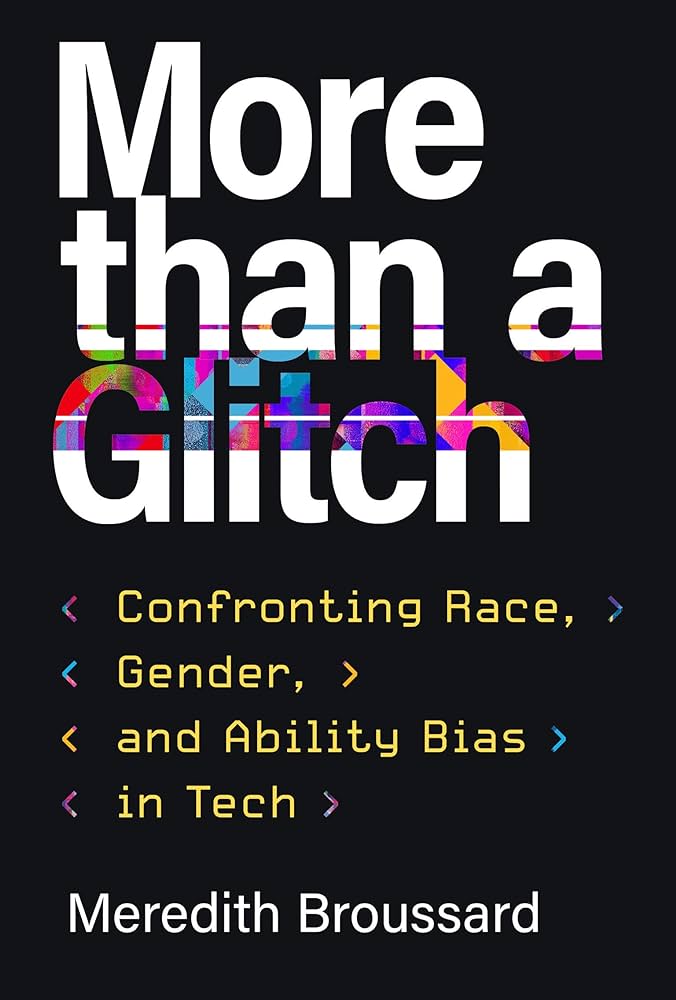 The word “glitch” implies an incidental error, as easy to patch up as it is to identify. But what if racism, sexism, and ableism aren’t just bugs in mostly functional machinery—what if they’re coded into the system itself? In the vein of heavy hitters such as Safiya Umoja Noble, Cathy O’Neil, and Ruha Benjamin, Meredith Broussard demonstrates in "More Than a Glitch" how neutrality in tech is a myth and why algorithms need to be held accountable.
The word “glitch” implies an incidental error, as easy to patch up as it is to identify. But what if racism, sexism, and ableism aren’t just bugs in mostly functional machinery—what if they’re coded into the system itself? In the vein of heavy hitters such as Safiya Umoja Noble, Cathy O’Neil, and Ruha Benjamin, Meredith Broussard demonstrates in "More Than a Glitch" how neutrality in tech is a myth and why algorithms need to be held accountable.
Broussard, a data scientist and one of the few Black female researchers in artificial intelligence, masterfully synthesizes concepts from computer science and sociology. She explores a range of examples: from facial recognition technology trained only to recognize lighter skin tones, to mortgage-approval algorithms that encourage discriminatory lending, to the dangerous feedback loops that arise when medical diagnostic algorithms are trained on insufficiently diverse data. Even when such technologies are designed with good intentions, Broussard shows, fallible humans develop programs that can result in devastating consequences. Broussard argues that the solution isn’t to make omnipresent tech more inclusive, but to root out the algorithms that target certain demographics as “other” to begin with. With sweeping implications for fields ranging from jurisprudence to medicine, the ground-breaking insights of "More Than a Glitch" are essential reading for anyone invested in building a more equitable future. - Publisher's Description
Request this Title
Unmasking AI: My Mission to Protect What is Human in a World of Machines
Buolamwini, Joy (2023)
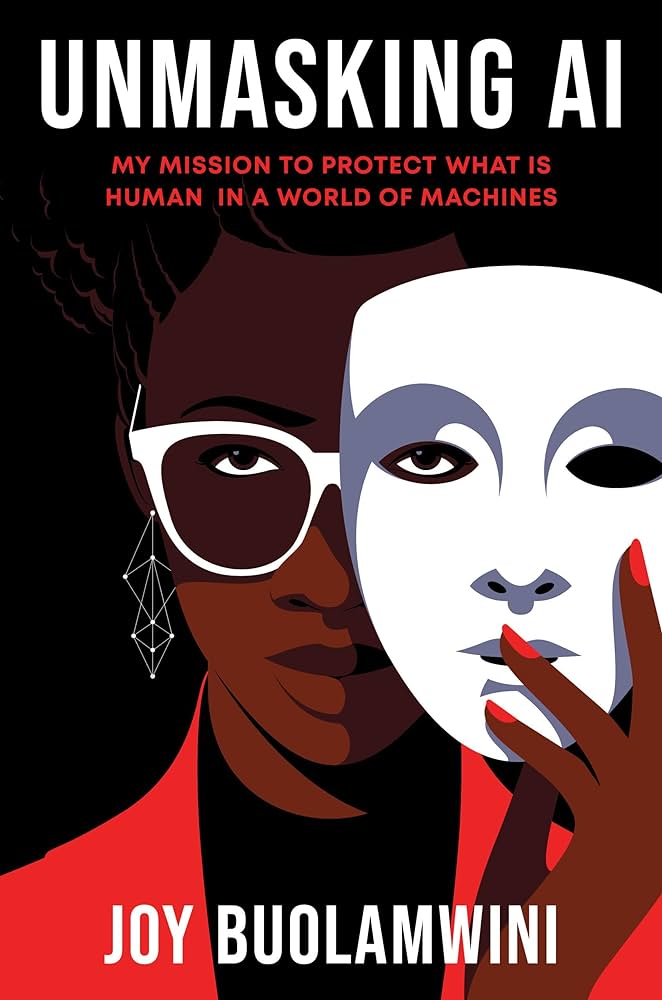 To most of us, it seems like recent developments in artificial intelligence emerged out of nowhere to pose unprecedented threats to humankind. But to Dr. Joy Buolamwini, who has been at the forefront of AI research, this moment has been a long time in the making. After tinkering with robotics as a high school student in Memphis and then developing mobile apps in Zambia as a Fulbright fellow, Buolamwini followed her lifelong passion for computer science, engineering, and art to MIT in 2015. As a graduate student at the “Future Factory,” she did groundbreaking research that exposed widespread racial and gender bias in AI services from tech giants across the world.
To most of us, it seems like recent developments in artificial intelligence emerged out of nowhere to pose unprecedented threats to humankind. But to Dr. Joy Buolamwini, who has been at the forefront of AI research, this moment has been a long time in the making. After tinkering with robotics as a high school student in Memphis and then developing mobile apps in Zambia as a Fulbright fellow, Buolamwini followed her lifelong passion for computer science, engineering, and art to MIT in 2015. As a graduate student at the “Future Factory,” she did groundbreaking research that exposed widespread racial and gender bias in AI services from tech giants across the world.
"Unmasking AI" goes beyond the headlines about existential risks produced by Big Tech. It is the remarkable story of how Buolamwini uncovered what she calls “the coded gaze”—the evidence of encoded discrimination and exclusion in tech products—and how she galvanized the movement to prevent AI harms by founding the Algorithmic Justice League. Applying an intersectional lens to both the tech industry and the research sector, she shows how racism, sexism, colorism, and ableism can overlap and render broad swaths of humanity “excoded” and therefore vulnerable in a world rapidly adopting AI tools. Computers, she reminds us, are reflections of both the aspirations and the limitations of the people who create them. - Publisher's Description
Request this Title
Feature image by YIFEI CHEN on Unsplash
